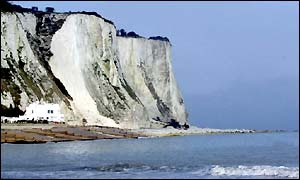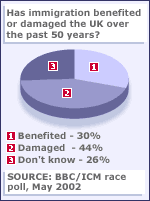Immigration: Fact or hype?

The white cliffs of Dover: Destination UK
By Dominic Casciani
BBC News Online community affairs reporter
What are the facts about immigration? BBC News Online looks at the current debate.
Figures from Migration Watch UK, a new group led by a former diplomat and an Oxford University demographer, predict more than two million people will arrive in the UK every 10 years for the foreseeable future.
Not surprisingly, the figures have dominated headlines amid the continuing debate over asylum, immigration and race relations in the UK.
According to the government's own figures, the UK has the "third largest foreign population and labour force in the European Union", around 2.2m people.
No one disputes that immigration to the UK has been increasing since the late 1990s. The problem is it's almost impossible to agree by how much. So how does Migration Watch UK reach its conclusions?
"We start from the belief that the scale of net inward migration is now so great as to be contrary to the interests of all sections of our community"
Migration Watch UK
The most up-to-date official statistics reveal that 125,000 people settled in the UK in 2000.
Groups such as the Immigration Advisory Service say that sounds a lot, but it represents less than a third of one percent of the UK's population.
Migration Watch UK then adds a further 60,000 to this figure to account for asylum seekers who enter the UK but "disappear".
The group then makes a number of further assumptions. Firstly, it estimates that there could be some 35,000 more people from outside the European Union who come on a visitor's visa and then never leave.
It then calculates that there are at least another 25,000 who arrive at these shores "clandestinely", for instance by hiding in a lorry crossing the English Channel.
Whether this is a double-counting of asylum seekers is not clear.
Official predictions
The government's own figures are completely different to those of Migration Watch UK.
It says that there are no figures for undetected migration so predictions and calculations are impossible to make.
Its prediction for net migration to the UK from 2003 onwards is 135,000 a year. It does indeed agree that there will be an extra two million arrivals - but only by 2021.
The Home Office says that Migration Watch UK's figures should be treated with "considerable caution".
For its part, the Immigration Advisory Service, the main expert body dealing with the issue on a day-to-day basis, says today's predictions are little more than "idle speculation".
Economic arguments
So this then brings us to the question of absorption. Migration Watch UK says that there is "no economic case for large scale inward migration".
This is something that numerous academics and the government reject.
 The UK's population is getting older, meaning that more working age people are needed to prop up the world's fourth largest industrial economy.
The UK's population is getting older, meaning that more working age people are needed to prop up the world's fourth largest industrial economy.
Secondly, there is a current shortage of highly-skilled people in key sectors such as the NHS, public services and the IT industry.
Thirdly, if the UK's population becomes more highly skilled and educated, there will be more and more jobs that people do not want to do. All of these factors have come together to create immigration demands.
One study by the University of Swansea predicts that we need to increase immigration by a fifth to protect prevent a population decline and subsequent economic crisis.
 Some of this thinking is already filtering down to government which is changing the entry rules to meet the needs of the job market.
Some of this thinking is already filtering down to government which is changing the entry rules to meet the needs of the job market.
Which brings us to the final question about Migration Research UK's predictions: Irrespective of the exact figures, how will it go down with the British public?
In May BBC News Online published a major survey of public attitudes on race and immigration issues in the UK.
Asked whether they believed that immigrants found it easy or difficult to integrate in the UK, some 61% of all respondents said difficult. The figure remained largely consistent across all ethnic groups.
But on the question of whether or not immigration was a good thing, the numbers differed quite dramatically.
Some 47% of white respondents said that immigration had damaged Britain with a quarter saying they did not know.
Approximately a third of black respondents and Asian respondents also said they did not know - indicating the uncertain nature of the current debate on immigration to the UK.
This article looks at the effect of having less migrant workers in the industry, as the menial jobs are not filled. Many of the migrants choose to move to different countries rather than the UK,with the implentation of an immigration cap raised an uproar by opponents.
Article from The Guardian on Immigration
Immigration cap will lead to skills shortages, say employers
Fewer foreigners are actually coming to the UK to work, say opponents of an immigration cap
Alan Travis, home affairs editor guardian.co.uk, Thursday 26 August 2010 20.00 BST Article history

Immigration minister Damian Green: he says he will rexamine the points-based system that controls foreigners seeking work in Britain. Photograph: Andrew Winning/Reuters
The abrupt introduction of a "radical cap" on immigration from next year will lead to major UK skills problems, employers warned today.
The Chartered Institute of Personnel and Development issued the warning after new figures showed an unexpected 20% rise in net migration to Britain: 196,000 people arrived in 2009, up from 163,000 the year before.
The jump was fuelled mostly by 60% fewer Britons leaving the country to live abroad – down from 90,000 to 36,000 – and by a 35% rise in overseas students coming to Britain.
At the same time, the actual number of people coming to work in Britain has continued to decline: there was a fall of 14% recorded in the 12 months to June 2010, which included a 30% fall in new national insurance registrations by Poles and other eastern Europeans.
Britain has become much less attractive to migrants as a result of the recession and the weakened pound, the Institute of Public Policy Research said.
"The increase in net immigration shown in today's statistics is bad news for the government, given its aim of reducing net immigration to 'tens of thousands' rather than hundreds of thousands," said a briefing from the institute yesterday. "With net immigration now rising again, after a period of substantial decline, this objective looks like it is becoming harder to reach."
The Chartered Institute of Personnel and Development said the sharp fall in the number of work-related visas – down by 14% to 161,050 in the year to June 2010 – showed the points-based system was robust and working.
"The reality for employers is that training workers to plug the UK skills gap is a lengthy task," said the institute's Gerwyn Davies. "The abrupt introduction of a radical cap would therefore leave many employers with a bigger skills problem and tempt employers with global operations to offshore jobs, where they can find the skills."
Damian Green, the immigration minister, said the unexpected rise in net migration – the numbers coming to live in the UK minus those leaving – meant the government would now need to re-examine routes outside the points-based system.
"What these figures tell me is that we also need to look at the other routes by which people come into this country, maybe for education, for family reunion reasons and also, in particular, routes that lead to permanent settlement," said Green. "Because hidden in these figures are two very big increases: one, of the number of students coming in, and the other, of the numbers of people settling here and gaining citizenship here."
The coalition has already imposed a temporary cap on the number of skilled workers coming to Britain from outside the EU and is now debating the introduction of a permanent limit from January. The government has pledged to bring net migration down below 100,000 before the next general election.
Although a net migration figure of 196,000 for 2009 is higher than the previous year, it is still well below the peaks of about 220,000 seen in 2005 and 2007 when the flow of migrants from the new EU states – Poland, the Czech Republic and the Baltics – was at its highest.
The official immigration statistics also show a continuing decline in the number of asylum seekers coming to Britain. Only 4,365 arrived between April and June this year – a 29% fall compared with the same period in 2009. The Home Office said two-thirds of the decline was because of a drop in applications from Zimbabwe.
Both the Refugee Council and Refugee Action highlighted figures showing that almost a third of asylum appeals were being allowed and argued this demonstrated that a significant number of asylum claims were being wrongly refused. The welfare groups said that the figure rose to 50% in cases involving people from Somalia, which showed the danger of the government cutting legal aid for asylum appeals.

No comments:
Post a Comment